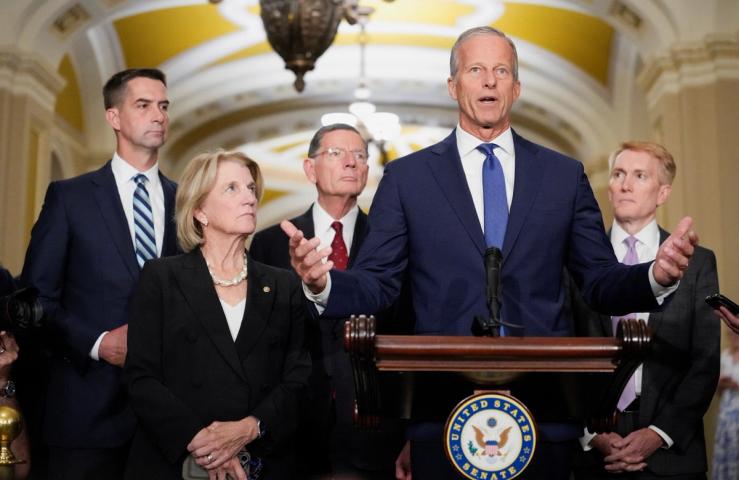The News
President Donald Trump’s frustration with his long list of stalled nominees is about to land back in the lap of the Senate.
And Republicans are still prepared to change the chamber’s rules unilaterally to quicken the pace of confirming Trump’s picks.
“We need a change in behavior with the Democrats or we’re going to need to change the rules, one way or the other,” Senate Majority Whip John Barrasso, R-Wyo., told Semafor on Wednesday. “There was a lot of agreement [this summer] that we need to do something. Because this can’t continue.”
Republicans are planning to discuss the impasse next week as soon as they return to Washington. They will mull several options for changing the rules as well as the possibility of using recess appointments, which will require close coordination with the House.
GOP senators confirmed some of Trump’s officials before breaking for August, but they’re still seeking a broader solution for moving the 145 nominees who are ready for floor votes. At the heart of the problem are the tactics that both parties have used more aggressively over the past 20 years to delay confirmations — the minority party can’t stop a president’s picks from getting approved, but its members can slow things down.
Sen. Tommy Tuberville, R-Ala., for instance, slowed military promotions under President Joe Biden to a halt over his disapproval of the Democrat’s abortion policy. Now Senate Democrats are slowing Trump’s nominees, incensing the president as well as his party.
Trump has seen essentially none of his civilian nominees approved easily since Marco Rubio was confirmed as secretary of state — a unanimous vote that Democrats quickly grew to regret. In practice, most Trump nominees receive a procedural vote and a few hours of debate, limiting the number of nominees the Senate can process in a day to three or four.
At that rate, Barrasso said, “even if you did no legislation, you would never, ever catch up.”
Senate Minority Leader Chuck Schumer defended his party’s strategy on Wednesday: “Historically bad nominees deserve a historic level of scrutiny by Senate Democrats.”
There are more than 1,000 Senate-confirmed positions; both parties are interested in cutting those down in theory, though no such deal is actively being discussed at the moment.
The president initially called on the Senate to cancel its recess and grind through his nominees. Ultimately, though, he and Schumer were unable to come to a deal on unfreezing some spending in exchange for confirmations — and Trump told the Senate to get out of town.
In this article:
Know More
Republicans have several ideas for changing their rules via the unilateral “nuclear option,” which allows 51 senators to change the chamber’s precedent. Senate Republicans previously used the nuclear option to lower debate time for judicial nominees and kill the 60-vote threshold for Supreme Court nominees; Senate Democrats first used it to eliminate the 60-vote requirement for all other nominees in 2013.
To resolve the current Trump impasse, the GOP is considering getting rid of the procedural vote before final confirmation, or allowing a bloc of nominees to get voted on at the same time. They could also shorten debate time for lower-level nominees below two hours (Cabinet nominees and appellate judges would retain their 30 hours of debate).
“They’re all in the mix,” Barrasso said of the options. “For so many of these sub-Cabinet positions that still require confirmation, we need to find an efficient way to do that.”
He also said recess appointments are a short-term possibility for the future. In order to take that route this summer, the House would have had to return to Washington to sync up with the Senate and formally recess. In September, both chambers will be back in session together, and Barrasso said there was “an appetite” in the Senate for recess appointments if needed.
A bipartisan deal is also an option, but Republicans would favor a rules change and Democrats would need something substantive from Trump to cave on his nominees. Republicans also see every recess now as a potential pressure point on nominees, giving Democrats leverage and throwing senators’ plans back home into chaos.
Burgess’s view
The Senate rules have only gone one way since 2013: nuclear. And it feels like the chamber is reaching its breaking point with how nominees are handled.
Making lower-level confirmations easier would ultimately benefit both parties, allowing the next Democratic president to more easily staff their administration. It’s possible Democrats would have made that change during Biden’s presidency, but they lacked the votes to do so.
They also tried to water down the legislative filibuster, something Republicans insist they won’t do.
But the more routine the Senate’s party-line rules changes and legislation becomes, the more clear it is that the filibuster is in danger, too.



